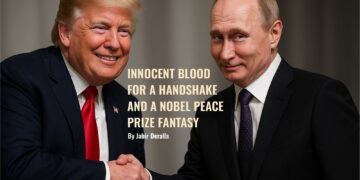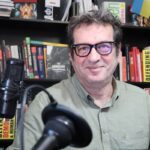Silence is never neutral.
Have we reached a moment in history when human cruelty, cold hearts, and cynicism no longer provoke outrage, but define the norm? A moment when an average social media user is more touched from a post of a police officer rescuing a kitten than from images of death or starvation of an infant… Is this a world where shameless and sadistic strongmen rule with no democratic control, while all others watch in silence? Have we become a civilization detached from humanity, a species blind to its future? Do machines now carry more humanity and honesty in their silicon circuits than those sworn to defend democracy and human rights?
Is this yet another essay about all this? Another drop in the ocean of talking and doing nothing? One more article written by some middle-aged intellectual from a tiny country in the grotesquely divided and tumultuous Balkans? Just another guy already bruised by relentless smear campaigns at home, and ignored by a pretentious Europe – because, after all, the Balkans can’t possibly be a place of great ideas, can it? The kind of place that produces trouble, not vision. That’s how the narrative goes. And maybe that’s yet another reason why – when we speak truths that should shake the world – our voices sink quietly into the noise.
Have the guardians of democracy – those who once vowed to stand against tyranny – lost their voice and courage? In the face of rising authoritarianism and the suffering of millions, international institutions issue hollow statements while civil society seems to remain indifferent or fights with broken shields. Academics drown in endless debates, failing to confront the brutal realities. Meanwhile, AI, with its cold algorithms and silicon memory, seems to offer more clarity, insight, and even moral reasoning than the combined efforts of our global intelligentsia and institutions. What does it say about us when machines – built to serve humans – demonstrate a greater capacity for truth and foresight than those entrusted with defending humanity’s dignity?
There is a brutal war in Ukraine—one that defines the future of global security and democracy. Putin’s Russia, having learned from its earlier failures, has rearmed, regrouped, and continues its slow, grinding advance in the east. Meanwhile, it bombards the entire country without pause—with a rain of missiles and bombs, and swarms of drones—striking civilian infrastructure and targeting cities on a daily basis. It kidnaps children. It tortures and kills. This is GENOCIDE. True – Ukraine is not abandoned, far from it. Democratic countries have mobilized. Military and humanitarian aid flows in, resolutions are passed, visits are made. But it is not enough. And it is rarely on time. Each delay costs lives. Every hesitation strengthens the aggressor. The world watches a democratic nation bleed, piece by piece, while timetables and budget approvals stall the lifelines that could save lives.
And then there is Gaza – the hell on Earth. A place where starvation, thirst, disease, and death rain down on a besieged civilian population. Children rot under rubble, die from dehydration, or waste away without medicine. This is not collateral damage – it is the destruction of life as a strategy. It is collective punishment, systematic deprivation, and the erosion of moral boundaries under the guise of a “right to defend.” No one is safe – not in shelters, not in hospitals, not even in the so‑called “humanitarian aid delivery zones.” What remains of humanity’s conscience when children die not just from bombs, but from hunger and despair? This is GENOCIDE.
The greatest tragedy of our time is that so many have abandoned the very idea of humanity. And among those who still claim to hold it dear, far too many treat it as an abstract concept, something to discuss in essays, speeches, and conference panels, not something to fight for, protect, and live by. Humanity has been reduced to a talking point, a token in the game of personal branding and career advancement. That’s really disgusting, don’t you think so?
Our systems are rotten to the core. In countries at peace, declared as democratic in annual charts – the rhetoric of “protecting the public interest” is too often a mask for tightening control, stripping away human rights, shrinking freedoms, and stoking fear of the “other.” And behind it all, the already powerful grow more powerful still, feeding on the weakness of the rest.
And then there is the cult of academism and false balance – the safe haven of self‑satisfied, smart‑ass quasi‑rebels who see no further than the tip of their own noses. PhDs who can recite volumes on postmodernism or draft perfect papers on animal rights, gendered language, or the politics of coffee beans, but who are far from truly concerned about the slow and bloody death of humanity unfolding before our eyes. They attend conferences and panels where genocide is just another “case study,” stripped of urgency, reduced to a data point in a PowerPoint slide. They pride themselves on neutrality, on “seeing both sides,” even when one side drops bombs on children in Kyiv or starves them to death in Gaza – or in places not yet deemed worthy of headlines. These intellectuals are never without words, but too often without courage and integrity.
Wars never stay contained. They spread like wildfire across borders, minds, and generations. One war left unresolved becomes an open invitation for the next. One dictator left unpunished inspires others. If the free world continues to falter – paralyzed by bureaucracy, appeasement, or moral fatigue – more generals, more warlords, and more authoritarian leaders will see violence not as a last resort, but as a legitimate path to power, prestige, and territorial gain.
They are watching. They are watching very closely. Taking notes. Testing limits. And planning.
Make no mistake: every moment of democratic hesitation convinces these men that the world will never stop them, and that their crimes will be buried in the graveyard of impunity. That the price of aggression is low, and the reward, enormous. This is not speculation. It is historical fact. The failure to confront one genocidal regime invites another. The refusal to draw lines emboldens those who already march over corpses. Soon, a chain reaction will unfold – one war birthing another, and another, and another – until the world collapses into destruction and lawlessness. Finally, not even a third world war will save our souls. It will only ensure that the most powerful survive it, after causing it in the first place.
The price of inaction and silence – of polished phrases, tidy academic papers, and the crawl of diplomacy – will be nothing less than the collapse of the world as we know it. Entire nations will vanish. Millions of children will never grow up. Despair, darkness, and destruction will inhabit the minds of generations. Societies will die. Freedom will become a distant memory, just like democracy and the rule of law. In their place, silence and obedience will become the currency of survival. The strong will dictate, and the weak will be forgotten. That is the cost of delay. That is the consequence of looking away. And all this is only the beginning.
















